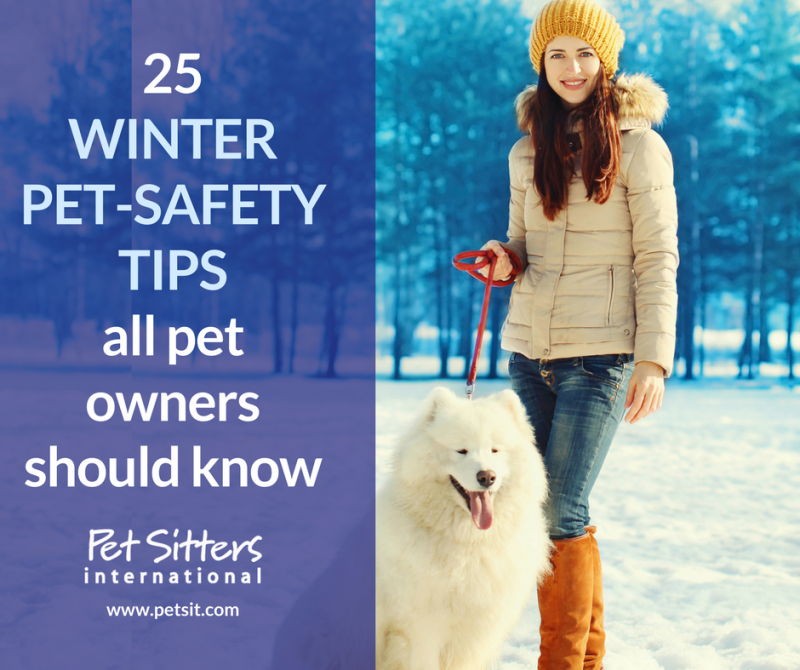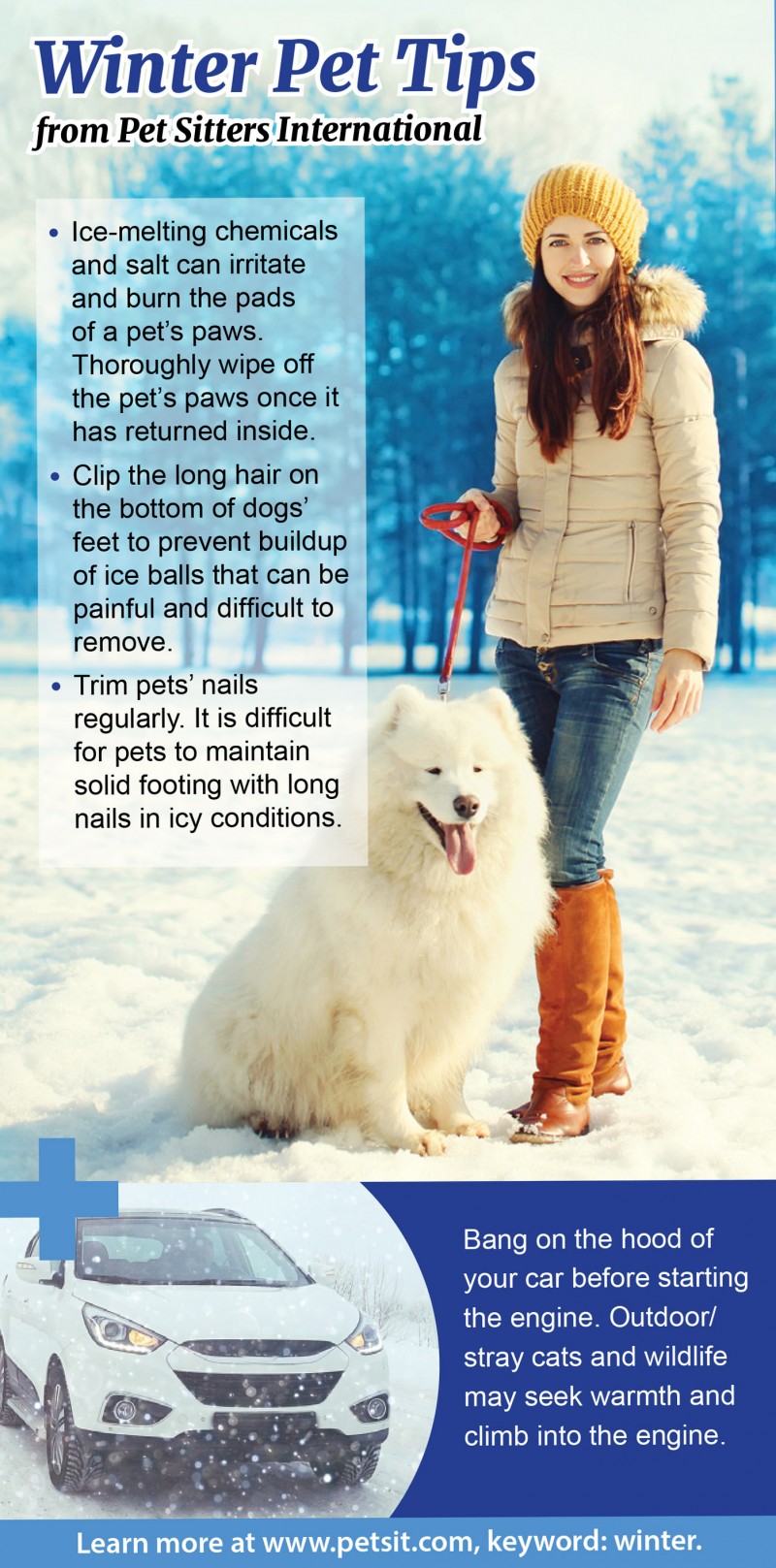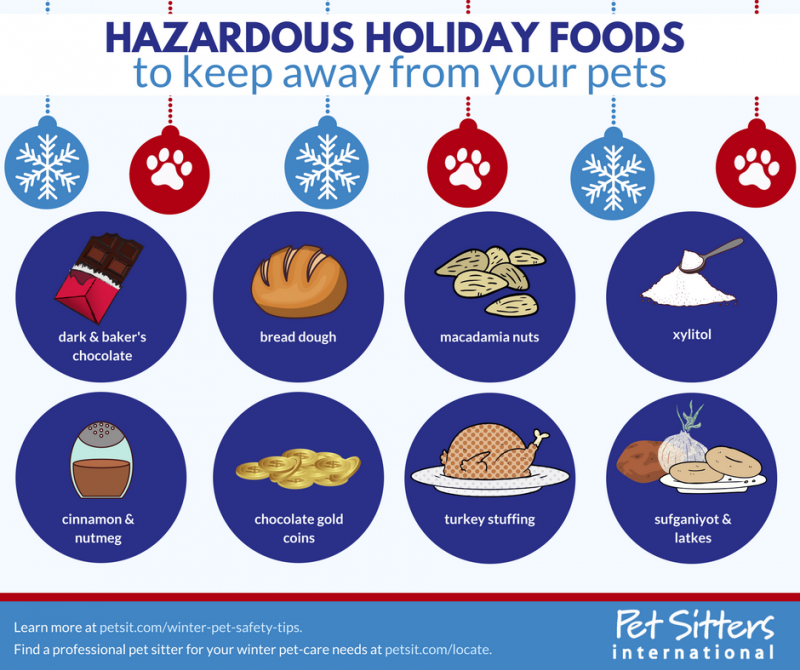25 winter pet-safety tips all pet owners should know

Depending upon your location, you may already be feeling the first chills of the impending winter season in the air. As the weather turns cold, it is important to consider how seasonal changes affect your pets.
Oh, the weather outside is frightful, but you can keep Fluffy and Fido so delightful…
If you live in a colder climate, the following tips will help keep your pets safe when the temperature dips:
- Keep pets inside as much as possible. Young pets, old pets and short-haired pets are more vulnerable to cold weather and should not be left outside unsupervised.
- If your pet has to be kept outside, provide shelter for it. Add straw for additional insulation from the cold and provide a snug, warm bed that does not sit directly on the ground.
- Provide your pet with extra food and water, in plastic bowls, when outside for extended periods of time.
- Ice-melting chemicals and salt can irritate and burn the pads of your pet’s paws. Thoroughly wipe off your pet’s paws once it has returned inside.
- Clip the long hair on the bottom of your dog’s feet to prevent buildup of ice balls that can be painful and difficult to remove.
- Trim nails regularly. It is difficult to maintain solid footing with long nails in icy conditions.
- Antifreeze is poisonous. Be sure to thoroughly clean up any spills and store household chemicals out of your pet’s reach. Consider using products that contain propylene glycol rather than ethylene glycol.
- Bang on the hood of your car before starting the engine. Cats and wildlife may seek warmth and climb into the engine.
- Make sure your pet has a warm place to sleep. All pets, including small caged pets, need to be kept warm and away from drafts.
- Contact your veterinarian immediately if you suspect your pet has frostbite or hypothermia.
Following these winter-proofing tips will help keep your pets healthy, happy and safe during the cold winter months, but keep in mind this season brings other unique dangers—even if your temperatures won’t be dropping.

Everybody knows a turkey and some mistletoe…can make the season not so bright for your pets.
This time of year also marks the busy holiday season, and there are several tips you should keep in mind to ensure the happy holidays don’t turn into a time of danger for your pets:
- Christmas trees add beauty to the home, but pine tree water can be poisonous, so it is best to use an enclosed tree stand. If that is not possible, be sure to cover open tree stand bases. Make sure that the tree is secured to the wall with strong wire or twine, because a toppling tree can cause serious injuries to dogs and cats.
- Ornaments and hooks, twinkling lights and electrical wiring pose significant danger to pets by ingestion or contact. When no one will be around to supervise, unplug lights and any electrical decorations a pet has access to. Cover or tack down electrical cords.
- To avoid pets being burned or causing a fire hazard, ensure that pets are confined away from any room containing a lit Hanukkah menorah or holiday candle.
- Keep holiday game pieces, such as the dreidel, out of paw’s reach from pets to avoid accidental ingestion.
- Holiday plants that are poisonous to pets include the berries of the mistletoe, holly, hibiscus, Christmas roses and the poinsettia. Keep these plants out of pets’ reach.
- If your pets are easily frightened or not used to being around a lot of people, the holiday season can be an especially stressful time. If your home will be the location for any holiday celebrations, make sure you have a room set aside where your pet can relax with favorite toys and will not be disturbed by guests. And make sure your pet is wearing an identification tag with your name and contact information, in case he or she slips out the door as guests come and go. You may also want to consider microchipping your pet
Food is another culprit for some of the most common holiday pet emergencies. The FDA has recently issued warnings about the dangers of bone treats, and there are many foods you may plan to enjoy this season that could pose health risks for your pets.
PSI recommends that pet owners be cautious of the following:
- Dark and baker’s chocolate. While milk chocolate is not poisonous, it will cause a pet to have an upset stomach. On the other hand, dark chocolate and baker’s chocolate contain high levels of theobromine and caffeine. Animals are extremely sensitive to both, and ingesting either type of chocolate could be fatal.
- Chocolate gold coins. These treats—sometimes used in Hanukkah and Christmas traditions—should be kept in a location that cannot be accessed by pets. Not only do the chocolate coins contain theobromine and caffeine, but the shiny foil wrappers can also cause intestinal issues if digested.
- Xylitol. This sugar substitute causes a dog’s blood sugar to drop quickly. This poisoning can be treated, but causes liver failure if not treated properly.
- Macadamia nuts. Dogs experience severe weakness in their back legs, appearing paralyzed, after ingesting macadamia nuts. Dogs usually recover from this condition within three days.
- Holiday spices. Spices commonly used in holiday foods and treats, such as nutmeg and cinnamon, can cause a variety of issues—from mild stomach upset and blisters in the mouth to more severe symptoms like vomiting and hallucinations—if consumed in large quantities.
- Turkey stuffing. While some holiday staples, like turkey, are okay for pets, be sure to remove any excess fat and skin and be wary of turkey stuffing. Stuffing often contains onions and/or garlic, both of which can cause potentially dangerous anemia if consumed in large quantities.
- Bread dough. When bread dough is ingested it continues to rise, causing an intestinal blockage.
- Latkes and sufganiyot. For pets, ingestion of these Hanukkah treats could result in a variety of gastrointestinal issues, including vomiting and diarrhea. Also, some ingredients can have even more dangerous consequences. The onions in latkes, for example, can cause Heinz body anemia in both cats and dogs.
If a pet ingests any potentially harmful product, pet owners should call a veterinarian or a local emergency animal hospital immediately.

If you can’t say “I’ll be home for Christmas…”
PSI offers one final tip for this season: If holiday errands or winter trips will keep you away from home, professional pet sitters offer the best pet-care solution—but book without delay. Many pet sitters get booked up weeks before major holidays.
Remember, just because someone is a pet lover and has a profile on an online directory—or even on a nationally-publicized site—doesn’t ensure he or she is a qualified pet sitter operating a legitimate business. In today’s sharing economy anyone can offer their services online, so it’s important to take a closer look to ensure you are hiring not just a pet lover, but a pet lover who is also a true pet-care professional.
You can download free Pet-Sitter Interview Checklist and search PSI’s Pet Sitter Locator free of charge at www.petsit.com/locate.







Comments
Doo Care
Cat Sitter Wilmington De
Jennifer